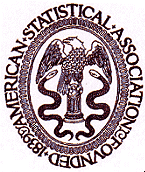 |
|
|
Pre-conference Course (Tuesday, June 2, 2009, 9am - 5pm, IBM Hawthorne I building, Rm 1S-F53, 19 Skyline Drive, Hawthorne, NY 10532): Introducing the Instructors: Dr. William Q. Meeker is a Professor of Statistics and Distinguished Professor of Liberal Arts and Sciences at Iowa State University. He is a Fellow of the American Statistical Association (ASA) and the American Society for Quality (ASQ) and a past Editor of Technometrics. He is co-author of the books Statistical Methods for Reliability Data with Luis Escobar (1998), and Statistical Intervals: A Guide for Practitioners with Gerald Hahn (1991), six book chapters, and of numerous publications in the engineering and statistical literature. He has won the ASQ Youden prize four times and the ASQ Wilcoxon Prize three times. He was recognized by the ASA with their Best Practical Application Award in 2001 and by the ASQ Statistics Division's with their W.G. Hunter Award in 2003. In 2007 he was awarded the ASQ Shewhart medal. He has done research and consulted extensively on problems in reliability data analysis, reliability test planning, accelerated testing, nondestructive evaluation, and statistical computing. Dr. Luis A. Escobar is a Professor in the Department of Experimental Statistics, Louisiana State University. He holds a BS from National University, Medellin, Colombia, an MS from the Inter-American Statistical Training Center (CIENES), Santiago, Chile, and a Ph.D. from Iowa State University. His research and consulting interests include statistical analysis of reliability data, accelerated testing, survival analysis, linear and non-linear models. Professor Escobar is an Associate Editor for Lifetime Data Analysis and past Associate Editor for Technometrics. He is a Fellow of the American Statistical Association and an elected member of the International Statistics Institute. Professor Escobar was awarded the 1999 Jack Youden Prize and he has won two awards for outstanding teaching at Louisiana State University. He is the co-author of Statistical Methods for Reliability Data (Wiley 1998), and author of several book chapters. His publications have appeared in the engineering and statistical literature. Abstract Reliability assurance processes in manufacturing industries require data-driven information for making product-design decisions. Life tests, accelerated life tests, and accelerated degradation tests are commonly used to collect reliability data. Data from products in the field provide another important source of useful reliability information. These reliability studies typically yield data that are censored and/or truncated, require the use of less familiar distributions like the Weibull, the lognormal, and the gamma, and call for inferences that involve extrapolation. The purpose of this course is to make modern methods for analyzing failure-time and degradation data available to a wide audience of practitioners. The course will describe and illustrate the use of a mix of proven traditional techniques, enhanced and brought up to date with modern computer-based methodology. Topics to be covered include censored data, nonparametric estimation, probability plotting, maximum likelihood estimation, likelihood-based confidence intervals, acceleration models, accelerated life testing, and accelerated degradation testing. The general concepts and methods in this course also have applications in engineering, medicine, life sciences, sociology, economics, and other sciences. Most of the examples in the course will come from applications of product reliability, but some biological examples will also be presented to illustrate the breadth of application. This course will focus primarily on applications, data, concepts, methods, and interpretation. There will be little or no theory presented and results of complicated computations will be illustrated graphically. As such, the required technical background for the course is minimal. The material in this course will be of interest and accessible to individuals ranging from engineers having had only one or two courses of statistics in their education/training through individuals with advanced degrees in statistics. |